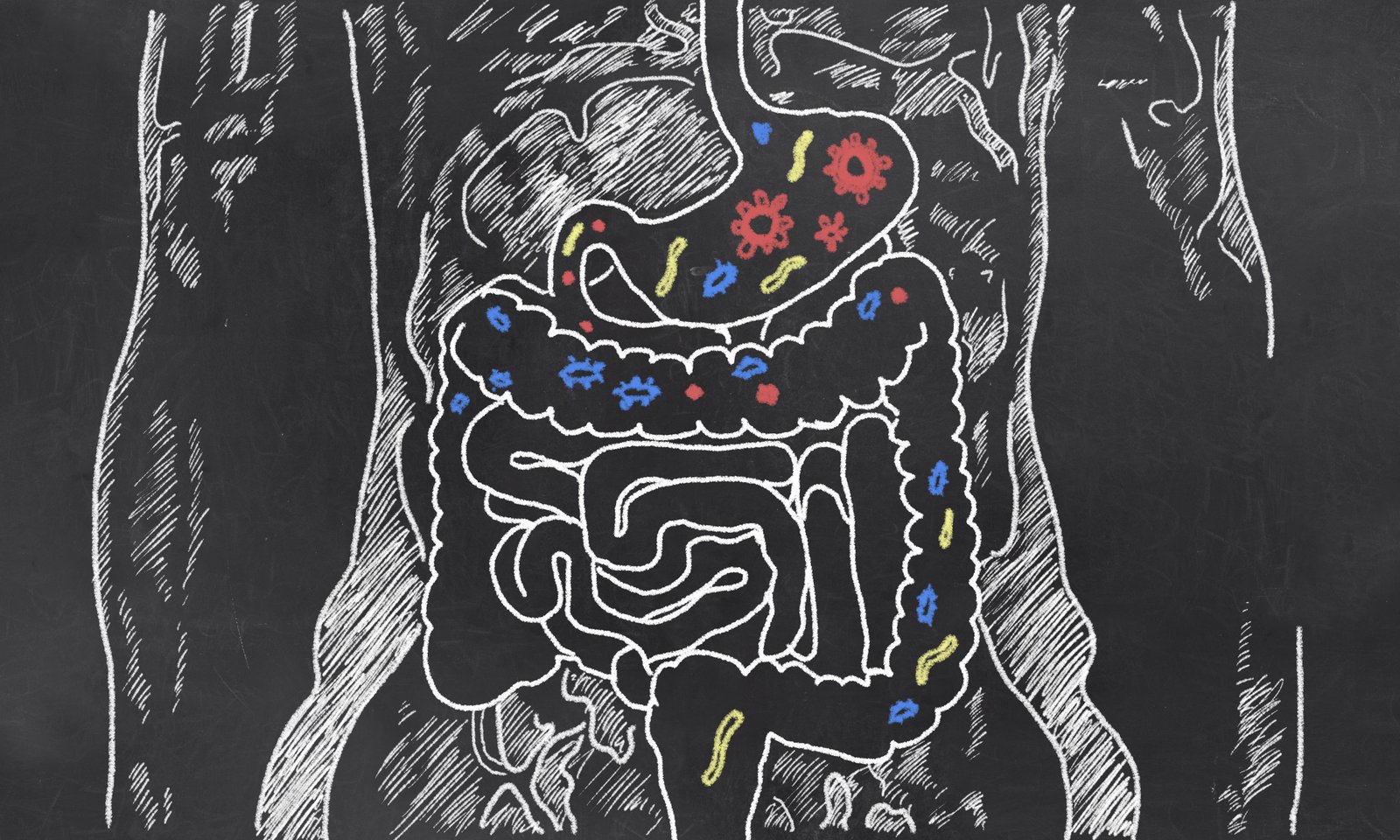Bacteria: *Literally Existing*
Human: *squirts hand sanitizer*
Although it may seem like humanity has been in a never ending war with bacteria, we actually exist through our participation in this symbiotic relationship.
These bacteria and other microorganisms are primarily found in your intestines. Collectively, they are known as your microbiota and in many foods and supplements, they are referred to as probiotics.
Probiotics have increased in popularity over the last decade. Many consumers oftentimes choose one brand over another at the store as long as it has probiotics.
But why do we need probiotics?
First, let’s discuss what probiotics and their less heard of counterparts, prebiotics are.
While disease-causing bacteria certainly exist, other bacteria can actually benefit our health. Probiotics are live human-cultured microorganisms with the intended purpose of offering positive health benefits to the host. When consumed through your diet or supplementation they survive in your gut and offer similar benefits as our naturally occurring gut flora.
Unlike probiotics, prebiotics are a type of non-digestible fiber that serves as a food source to the good bacteria in your body. Since they cannot be broken down by our digestive system, prebiotics make their way near the ends of our intestinal tract where they are used by bacteria as nutrients to further stimulate their growth.
With over 100 trillion microorganisms from 500 different species composing your own unique microbiota, it is something you want to take care of and pay close attention to.
What affects my microbiota?
Your microbial composition is largely influenced by a variety of different factors. Diet, age, ethnicity, lifestyle, the host’s individual health among many others all contribute to the health of your microbiota. [1]
Healthy individuals already have a healthy amount and diversity of good bacteria in their gut. Unfortunately, not everyone always has a healthy amount of bacteria in their gut and this can oftentimes be due to inadequate consumption of fiber that keeps the good bacteria alive.
Other individuals unfortunately face chronic diseases such as gut dysbiosis. This disease refers to an imbalanced state of microorganisms within the intestines.
Since the state of your microbiota has been scientifically proven to impact your health, below we’ve compiled a list of 8 health benefits of prebiotics and probiotics.
1. Balancing gut health
Beneficial bacteria in your gut helps maintain a balanced digestive system. Millions of people suffer from digestive issues such as irritable bowel syndrome (IBS). [2]
IBS is a condition that affects the large intestine causing recurrent symptoms such as abdominal pain, bloating, diarrhea or constipation. These symptoms can range from mild to severe and are associated with anxiety, stress, or depression. 
Although the mechanism for how probiotics can help with IBS remains yet to be understood there is evidence that suggests a link exists between IBS symptoms and changes in gut flora composition. In fact, individuals with IBS symptoms have reduced amounts of Lactobacillus and Bifidobacterium (good bacteria) composing their microbiota, and elevated levels of E. coli, Streptococcus and Clostridium (bad bacteria). [3]
It is yet unknown if the change in gut flora composition is the cause of IBS or the result. Whatever the case may be, changes in the gut flora can increase gas production sensitivity, alter bowel motility and increase inflammation furthering IBS symptoms.
Symptoms of IBS are improved by probiotics through:
- Fighting inflammation
- Slowing down bowel movements
- Reducing gas through gut flora balancing
- Lowering gut’s gas buildup sensitivity
2. Reduce frequency & duration of diarrhea
In 2017, roughly 1.6 million people died from diarrhea-related diseases worldwide.[4] Although the data is disproportionate and risks vary depending on whether you live in a developing or developed country, chances are you may have had diarrhea multiple times throughout your life.
You’ve probably been told by your physician to drink plenty of fluids to avoid dehydration and simply allow the diarrhea-causing infection to run its course.
Not all diarrheas are the same however. Different types of diarrhea can be caused by bacterial or viral infections, antibiotics or even exposure to different microorganisms when traveling.
In 2010, a review of 63 studies with 8,014 participants was performed to determine the effects of probiotics on people with acute diarrhea. The results showed probiotics safely reduced duration of diarrhea by over a day — 25 hours to be exact. This includes reduced stool frequency and duration. [5]
Oftentimes, when patients are prescribed antibiotics which eliminate harmful bacteria, it can also harm the beneficial bacteria in our own microbiota.[6]
This allows for microbes such as ulcer causing H. pylori and diarrhea/colon inflammatory C. difficile to multiply much more effectively without having to compete for nutrients against our protective good bacteria.
In 2017, a separate review of 17 studies was performed to assess the effects of probiotics on individuals with antibiotic-associated diarrhea. Results showed probiotics such as Lactobacillus rhamnosus GG and Saccharomyces boulardii species could potentially reduce antibiotic-associated diarrhea by up to 51%.[7]
When taking probiotics studies have demonstrated they can prevent and even treat certain types of diarrhea in children and adults. This is often achieved by repopulating the gut with beneficial bacteria in an effort to correct the imbalance therefore strengthening our symbiotic relationship.
3. Potentially improve mental health
Research sheds some light to the changes in intestinal bacteria potentially having some degree of influence on conditions such as depression and anxiety.
Your intestine has its own nervous system called the enteric nervous system (ENS) which produces the same neurotransmitters as the brain such as serotonin and acetylcholine. These neurotransmitters influence gut motility and imbalances may result in constipation or diarrhea.
Currently most antidepressants operate by altering neurotransmitter activity in the brain to help alleviate symptoms. In the past decade, research has shed some light on bidirectional communication between the central nervous system (CNS) and the GI tract known as the gut-brain axis. This communication regarding hormonal, bacterial and neuronal changes are mediated through the vagus nerve.[8][9]
Many studies indicate a correlation between gut health and mental health, along with mood. There are 15 human studies that demonstrated good bacteria can help improve conditions, to some degree, related to:
- Anxiety
- Autism
- Depression
- Obsessive-compulsive disorder
One study published in 2015 assessed the effects of probiotic yogurt and multispecies probiotic capsule supplementation on the mental health of 70 petrochemical workers for 6 weeks. After 6 weeks, participants in the probiotic yogurt and probiotic capsule groups showed significant improvement in depression anxiety and stress scale (DASS) scores compared to when the study began. [10]
In a state of dysbiosis harmful opportunistic bacteria can colonize your gut and begin to proliferate. As a result, your immune system is alerted resulting in an inflammatory response. Research shows, however, inflammation can contribute to the onset of depression, and likewise depression can contribute to inflammation. This relationship highlights the importance of a diverse microbiome as it can prevent inflammation and by controlling inflammation, its possible both anxiety and mood can be improved.
Although probiotics may seem as a potential hope for treating neuropsychiatric conditions, there is still much research to be done to understand which strains of bacteria and at which dosage they are most effective.
It is still too early to draw definitive conclusions as the field of psychobiotics proves difficult since individuals don’t always experience mental health symptoms the same way. This being said, probiotics have not yet been proven to be an adequate replacement for standard mental health treatment.
4. Improves heart health

Heart disease is the leading cause of death worldwide, therefore it’s important to maintain your heart in overall good health.
Numerous studies have demonstrated the effects of Lactobacilli playing a role in lowering your cholesterol.
So, how does this happen?
Your overall cholesterol is composed of two types: low-density lipoprotein (LDL), also known as the “bad” cholesterol, and high-density lipoprotein (HDL) also referred to as the “good” cholesterol.
A study performed in 2012 studied the effects of L. reuteri on the cholesterol levels of 127 participants over the course of 9 weeks. At the end of the study, total cholesterol was lowered by 9% and LDL cholesterol (bad) was reduced by 12%. [11]
One of the hypothesized ways probiotics are able to achieve a hypocholesterolemic effect is by removing cholesterol and incorporating it into cellular membranes during growth. Another hypothesis includes converting cholesterol into coprostanol in the intestine which allows for direct excretion through feces.[12]
Research also highlight individuals who initially had higher cholesterol levels and take probiotics for a longer period of time in capsule form have been shown to benefit more from its effects.
5. Promotes women’s reproductive health
Bacterial vaginosis (BV) and yeast infections are some of the most common vaginal imbalance issues women face. Although the cause of BV remains uncertain, studies indicate low levels of Lactobacilli bacteria may play a role in its onset.
Yeast infections on the other hand are caused by a fungus called Candida albicans. When the vaginal environment has too few Lactobacilli, fungus is allowed to grow out of control.[13]
Probiotics taken for vaginal imbalances may be consumed through capsules, probiotic yogurt, or vaginal suppositories.
Currently, evidence that probiotics can help prevent or treat vaginal imbalances are hopeful, but remain inconclusive. Antibiotics remain the recommended treatment.
6. Prevents gastrointestinal infection
Your microbiota can serve as a line of resistance to potentially life-threatening invading microbes such as Clostridium difficile (C. diff), Helicobacter pylori (H. pylori) and E. Coli among many others.
The growth of these exogenous microbes is disrupted to a certain degree by our own microbiota.
1. Competitive exclusion
There are 2 ways our own microbiota compete with foreign pathogens.
Through competitive exclusion our own microbiota uses nutrients that harmful microbes may otherwise benefit from. The more beneficial bacteria that we have competing for nutrients, the more difficult it is for harmful bacteria to also take advantage of the nutrients.
Additionally, probiotics can also interfere with pathogens and toxins from binding to our intestinal epithelial cells, further hindering colonization of your gut.[14]
2. pH alteration
Probiotics are capable of lowering pH levels in the colon. By creating a more acidic environment, it becomes increasingly difficult for some invading pathogens to survive.
For example, E. coli grows best around a pH of 6.5-7.5.[15] By consuming probiotics that can lower your gut pH, the probability of colonization from harmful bacteria is significantly reduced since they have a hard time surviving in the acidic environment.[16]
3. Immune System
Probiotics may help maintain intestinal homeostasis by modulating your immune response to harmful microbes and stimulating the development of T-cells.[17]
Remember there is no such thing as “boosting” your immune system in an otherwise healthy adult. Your immune system is already finely regulated but evidence does show probiotics can help your immune system function properly.
7. Weight loss
Yes, you read that right. Nowadays it is easy to get lost in the plethora of fat loss myths you can find online, however there may be some merit to probiotics in helping shed off a few pounds. Probiotics may help you lose weight in 3 different ways.
The first way is believed to occur by increasing the amount of fat excreted through feces. This happens when certain consumed probiotics such as those from the Lactobacillus family inhibit the absorption of dietary fat, consequently reducing your caloric intake.[18]
Currently the most effective probiotic bacteria for weight loss is Lactobacillus gasseri. 
A study published in 2013 monitored the effects of Lactobacillus gasseri probiotics on 210 healthy Japanese adults with large amounts of fat around the stomach area for 12 weeks. Surprisingly, after 12 weeks belly fat reduced by 8.5% compared to almost no change from baseline noted in the placebo group. Additionally participants using the probiotic were observed to have a decrease in BMI, body fat, hip circumference and fat around organs. [19]
After 4 weeks of discontinued use, however, participants who lost weight began gaining it back.
The second way probiotics promote fat loss is through promoting the release of GLP-1, an appetite-reducing hormone. [20] Eating less and being in a caloric deficit is a proven way to lose fat.
Lastly, certain probiotic strains have been shown to increase Angiopoietin-like 4 (ANGPTL4) protein levels leading to reduced fat storage.[21]
Although these mechanisms sound promising further research is required to fully understand exactly how probiotics influence fat loss.
Remember, proper diet and exercise is the only way to get rid of unwanted fat. Probiotics should not be your first go-to for fat-loss.
8. Vitamin production
Our nutrition doesn’t only depend on what you put in, but also what your body is able to produce. The metabolic activity of our gut microbiota is responsible for synthesizing certain vitamins and bioactive metabolites.
Vitamin K along with some B vitamins (e.g. B12, Biotin, folate) are synthesized in our gut by our microbiota and become available for the host to use.[22] [23]
Vitamin K plays an important role in bone health and blood clot formation while B vitamins offer a range of health benefits including cardiovascular health, cell health, energy levels and proper hormone production.
How can I incorporate prebiotics and probiotics into my diet?
As previously mentioned probiotics are microorganisms that produce health benefits to the host’s body when consumed. This means not all fermented foods or beverages contain probiotics. On the other hand, you can find prebiotics in fruits and vegetables that contain complex carbohydrates like resistant starch and indigestible fiber.
Probiotic foods

Here are some foods that are guaranteed to give you a diverse amount of probiotics.
- yogurt
- sauerkraut
- milk
- pickles
- kimchi
For a more comprehensive list click here.
Prebiotic foods

Of course we cant forget the the nutrients necessary for probiotics to thrive.
- Oats
- Garlic
- Onions
- Flaxseeds
- Asparagus
For a more comprehensive list on prebiotic foods click here.
What to look for in a probiotic supplement?
If you are planning on using probiotic supplements, keep in mind there are many different kinds that are available on the market and not all probiotics are the same. Different probiotics achieve different effects.
Like all nutrients in your body, it is best that they come from your diet, however if you do decide to go down the supplement route here are a few things to look for before finalizing your decision.
- Expiration date and storage instructions
-
- Pay attention to expiration date since probiotic colony can begin to die from the time the product is manufactured to when its consumed.
-
- Colony Form Units (CFU) ≥ 5 Billion
-
- Greater CFU does not always mean a greater benefit. The dosage should be greater or equal to successful clinical studies to achieve similar health benefits. Manufacturers are not required to list live bacteria. A 4-billion CFU probiotic supplement may contain 2-billion live and 2-billion dead CFU.
-
- Enteric coated (less likely to die in stomach)
-
- A probiotic must however reach the gut alive therefore an enteric coat makes it more likely to survive stomach’s acidic environment.
-
Probiotic Supplements
Like all supplements available in the market probiotics are not regulated by the FDA. Make sure to pick trustworthy brands when deciding on which probiotics you want to use. To save you the headache and give you peace of mind, here at Pro Healthy Fitness we have done the research for you. Below are the top 3 probiotic supplement brands based off of Labdoor reviews:
Brand | Culturelle Digestive Health Probiotic | TruNature Advanced Digestive Probiotic | Garden of Life Whole Food Probiotic |
Colony Forming Units (CFU) | 10 billion | 10 billion | 15 billion |
Form | Capsule | Capsule | Capsule |
Probiotic Strain | Lactobacillus rhamnosus GG | Lactobacillus acidophilus, 11+ strains | Lactobacillus acidophilus, 12+ strains |
Labdoor Score | 98.1/100 | 95.2/100 | 94.7/100 |
Prebiotic supplements are not necessary if you are consuming adequate amounts of fiber in your diet. If you are still considering a prebiotic supplement, click here.
PHF on the subject
There’s a lot our gut microbiota does for us, and in many cases we can keep it balanced and healthy through the use of prebiotic and probiotic foods or supplements.
Again you don’t always have to go down the supplement route. Remember to diversify the foods you eat as many of them already have probiotics and can prevent you from spending too much on supplements.
Probiotics are not a miracle cure or prevention for any disease and should not replace any medically approved treatment. Always make sure to refer to your provider regarding prebiotic and probiotic supplement usage.





Loving the info on this internet site, you have done great job on the content. Harmonie Jonas Spanos
Merely wanna comment on few general things, The website design is perfect, the subject material is real excellent : D. Lanae Keith Sacken
You made a few nice points there. I did a search on the topic and found a good number of folks will have the same opinion with your blog. Blake Rudie Tumer
Excellent post! We are linking to this great article on our site. Keep up the great writing. Celia Ulrich Town